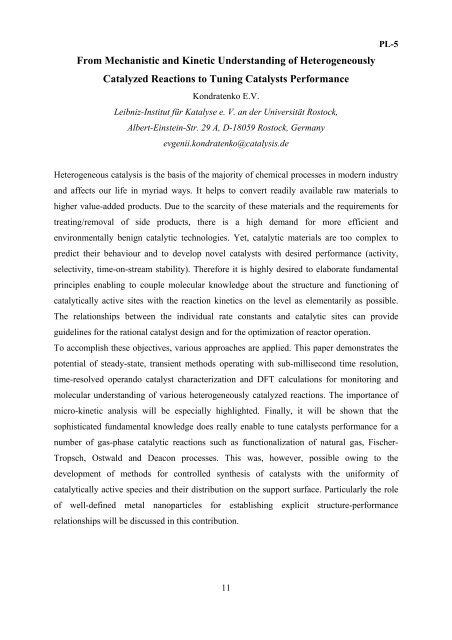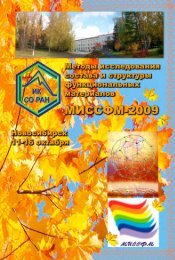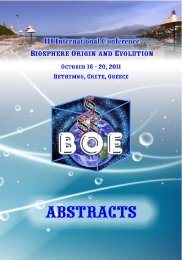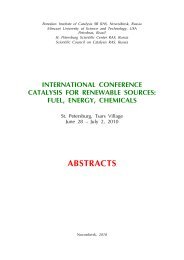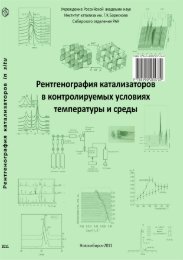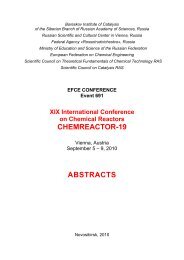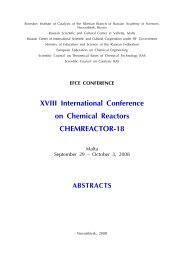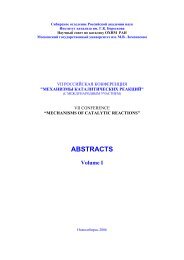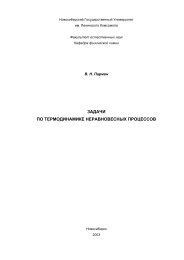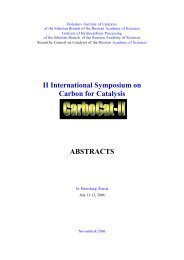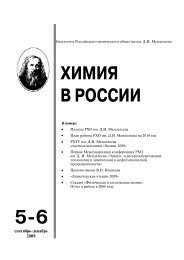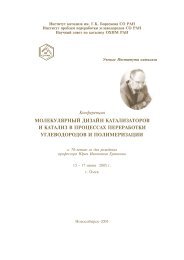- Page 3 and 4: CONFERENCE ORGANIZERS Boreskov Inst
- Page 5 and 6: INTERNATIONAL ADVISORY BOARDHonorab
- Page 8 and 9: PL-1Elucidating the Mechanism of He
- Page 10 and 11: PL-3Bio-Inspired Hydrocarbon Oxidat
- Page 14: KEYNOTE LECTURESKL‐1 KL‐9
- Page 17 and 18: KL-1The detailed mechanism of chain
- Page 19 and 20: KL-3Catalytic Oxidation Mechanism B
- Page 21 and 22: KL-5The “True” Explanation is T
- Page 23 and 24: KL-6(open) Pt sites significantly e
- Page 25 and 26: KL-7The questions of particular imp
- Page 27 and 28: KL-9Active Species of Nonheme Iron-
- Page 30 and 31: OP-I-1Particle Size Effect in CH 4
- Page 32 and 33: OP-I-3Activation of Oxygen on Micro
- Page 34 and 35: OP-I-5Oxidation of Alkanes: In Sili
- Page 36 and 37: OP-I-7Low Temperature Decomposition
- Page 38 and 39: OP-II-2Living Olefin Polymerization
- Page 40 and 41: OP-II-4Diphenylphosphinoferrocenyl
- Page 42 and 43: OP-II-6Mechanism of the Dimerizatio
- Page 44 and 45: OP-II-8Chiral Ionic Liquid/ESI-MS M
- Page 46 and 47: OP-III-2The Mechanism of Oxidative
- Page 48 and 49: OP-III-4Effect of Metal-Support Int
- Page 50 and 51: OP-III-6Self-Oscillations in the Me
- Page 52 and 53: OP-III-8Does the Bulk Matter? Metha
- Page 54 and 55: OP-III-10FTIR Spectroscopy in the S
- Page 56 and 57: OP-III-12Different Carbon Species a
- Page 58 and 59: OP-III-14Investigation on the Kinet
- Page 60 and 61: OP-III-16Scorpionate Gold Complexes
- Page 62 and 63:
OP-III-18Mechanism of Tetralin Ring
- Page 64 and 65:
OP-III-19ZnAl 2 O 4 phases. XRD and
- Page 66 and 67:
OP-III-21Dechlorination of Chlorohy
- Page 68 and 69:
OP-III-23Application of Model Syste
- Page 70 and 71:
OP-III-25Ce-O-Pt Active Sites in Ce
- Page 72 and 73:
OP-III-27Structure of Allylic Inter
- Page 74 and 75:
OP-III-29Enantioselective Hydrogena
- Page 76 and 77:
OP-III-31On Mechanisms of Oxidation
- Page 78 and 79:
OP-IV-1Kinetic Study of Aspen-Wood
- Page 80 and 81:
OP-IV-3Unravelling the Structure an
- Page 82 and 83:
OP-IV-5Selective Oxidation of Glyce
- Page 84 and 85:
OP-V-1Controlled Synthesis of Pt 3
- Page 86 and 87:
OP-V-3RuO x -VO x /TiO 2 as Very Hi
- Page 88 and 89:
OY-I-1The Theoretical Prediction of
- Page 90 and 91:
OY-II-2Non-Heme Iron and Manganese-
- Page 92 and 93:
OY-II-4Self-Immobilizing Catalysts
- Page 94 and 95:
OY-II-6Catalytic Effect of Si-Conta
- Page 96 and 97:
OY-III-2Platinum-Catalyzed Asymmetr
- Page 98 and 99:
OY-III-4Carbonylation of Dimethyl E
- Page 100 and 101:
OY-III-6Concentration Hysteresis in
- Page 102 and 103:
OY-III-7activity was showed with wa
- Page 104 and 105:
OY-IV-2Solvent-Free Allylic Oxidati
- Page 106 and 107:
OY-IV-4Direct Catalytic Treatment o
- Page 108 and 109:
OY-IV-6Influence of Different Param
- Page 110 and 111:
OY-V-1Kinetic Study of p-Nitropheno
- Page 112 and 113:
OY-V-3Microstructure Effects in Cat
- Page 114:
POSTER PRESENTATIONSSection I. Cata
- Page 117 and 118:
PP-I-1The use of parallelism in sol
- Page 119 and 120:
PP-I-3Mechanism Investigation of th
- Page 121 and 122:
PP-I-5Mathematical Modeling of Reac
- Page 123 and 124:
PP-I-6activation barriers for the r
- Page 125 and 126:
PP-I-8Allylbenzene Double-Bond Migr
- Page 127 and 128:
PP-I-10Ethylene to Benzene Catalyti
- Page 129 and 130:
PP-I-12Thermodynamic Studying of Ca
- Page 131 and 132:
PP-I-14Fractal Approach to Acid-Bas
- Page 133 and 134:
PP-II-2Chemistry Carbcations: β-Me
- Page 135 and 136:
PP-II-3Isobutylalumoxanes as Effect
- Page 137 and 138:
PP-II-5Mechanistic Scenarios for Ho
- Page 139 and 140:
PP-II-71 H NMR Study of Activation
- Page 141 and 142:
PP-II-9UV-Visible Spectroscopic Stu
- Page 143 and 144:
PP-II-11Selectivity of the Nickel (
- Page 145 and 146:
PP-II-13The Role of Complex Aluminu
- Page 147 and 148:
PP-II-15NMR Spectroscopic Trapping
- Page 149 and 150:
PP-II-17Nickel-Mediated Cross-Coupl
- Page 151 and 152:
PP-II-19Modeling of Tetraisobutylal
- Page 153 and 154:
PP-III-1Low-Level Hydrocracking of
- Page 155 and 156:
PP-III-3The Mechanism and the Optim
- Page 157 and 158:
PP-III-5The Catalytic Oxidation of
- Page 159 and 160:
PP-III-7Acid-Base Properties of Zn,
- Page 161 and 162:
PP-III-9Research of Activity of the
- Page 163 and 164:
PP-III-11Heterogenization of Wacker
- Page 165 and 166:
PP-III-13Isoquinoline Derivatives v
- Page 167 and 168:
PP-III-15Supported Heteropoly Acids
- Page 169 and 170:
PP-III-17Sulfur-Promotion in Conjug
- Page 171 and 172:
PP-III-19Hydrotalcite-Like Catalyti
- Page 173 and 174:
PP-III-21Mechanism of Hydrogen Oxid
- Page 175 and 176:
PP-III-22Mathematical Modelling of
- Page 177 and 178:
PP-III-24The Study of Adsorption of
- Page 179 and 180:
PP-III-26Study of the Liquid-Phase
- Page 181 and 182:
PP-III-28Influence of Support Treat
- Page 183 and 184:
PP-III-30Interaction of Single Meta
- Page 185 and 186:
PP-III-32Promoting Mechanism by Fe
- Page 187 and 188:
PP-III-34Studies of the Thermal Dec
- Page 189 and 190:
PP-III-36Hydrogen Assisted Growth o
- Page 191 and 192:
PP-III-38Graphene as a Matrix for C
- Page 193 and 194:
PP-III-40Regularities of Formation
- Page 195 and 196:
PP-III-42Catalytic Behavior of Deco
- Page 197 and 198:
PP-III-43XPS and STM Studies of Oxi
- Page 199 and 200:
PP-III-45Au-Ni Synergism in the Alu
- Page 201 and 202:
PP-III-47Doped Apatite-Type Lanthan
- Page 203 and 204:
PP-III-49An Efficient Nenitzescu In
- Page 205 and 206:
PP-III-51The Concept of Interlayer
- Page 207 and 208:
PP-III-52Synthesis of Catalysts for
- Page 209 and 210:
PP-III-54Aromatization of Methane o
- Page 211 and 212:
PP-III-56Transformation n-Hexane on
- Page 213 and 214:
PP-III-58Kinetic Features of the Hy
- Page 215 and 216:
PP-III-60Mechanism of NO-SCR with M
- Page 217 and 218:
PP-III-62Ethanol and CO Oxidation o
- Page 219 and 220:
PP-III-64Ceria-Induced, Sb-Promoted
- Page 221 and 222:
PP-III-66Platinum-Nickel Catalyst f
- Page 223 and 224:
PP-III-68Non-Steady-State Kinetics
- Page 225 and 226:
PP-III-70Decomposition and Steam Re
- Page 227 and 228:
PP-III-71New Approaches for Study o
- Page 229 and 230:
PP-III-73Effect of B-Cation Substit
- Page 231 and 232:
PP-III-75Influence of the ZrO 2 Pha
- Page 233 and 234:
PP-III-76Mechanism of Catalytic Eli
- Page 235 and 236:
PP-III-77Both reactions occur via a
- Page 237 and 238:
PP-III-79The Nature of Synergistic
- Page 239 and 240:
PP-III-81Influence of the Way of Ac
- Page 241 and 242:
PP-III-83Mechanism of Butadiene Het
- Page 243 and 244:
PP-III-85MgAlY Layered Double Hydro
- Page 245 and 246:
PP-III-87Study of the Mechanism of
- Page 247 and 248:
PP-III-89Oxygen Isotope Exchange of
- Page 249 and 250:
PP-III-90In case of Na 3 ZrM(PO 4 )
- Page 251 and 252:
PP-III-92Effects of Nanostructuring
- Page 253 and 254:
PP-III-93Direct Synthesis of Hydrog
- Page 255 and 256:
PP-III-95Soot Combustion in DPFs Ca
- Page 257 and 258:
PP-III-97Synthesis of Olefins from
- Page 259 and 260:
PP-III-99Turpentine Isomerization o
- Page 261 and 262:
PP-III-100Table 1. The specific sur
- Page 263 and 264:
PP-III-102СО 2 Tolerancy of Highl
- Page 265 and 266:
PP-III-104Cr, V and Pt in O 2 -Free
- Page 267 and 268:
PP-III-106Unusual DRIFT Spectrum of
- Page 269 and 270:
PP-III-108Acidic Properties and Loc
- Page 271 and 272:
PP-III-110The Composition, Structur
- Page 273 and 274:
PP-III-112Chemisorption and Oxidati
- Page 275 and 276:
PP-III-114Peculiarities of Ethane A
- Page 277 and 278:
PP-III-116Theoretical Calculation o
- Page 279 and 280:
PP-III-117quantity of mesopores and
- Page 281 and 282:
PP-III-119Atomic Layer Deposition f
- Page 283 and 284:
PP-III-121Catalysis on Zeolites: So
- Page 285 and 286:
PP-III-123One-Pot Hydrodebenzylatio
- Page 287 and 288:
PP-IV-2Transition Metal Peroxo Comp
- Page 289 and 290:
PP-IV-4The Selectivity of Methyl Pa
- Page 291 and 292:
PP-IV-6Application of the Concept o
- Page 293 and 294:
PP-IV-8Conversion of n-Paraffins Us
- Page 295 and 296:
PP-IV-10Novel Nanostructured Fe-, C
- Page 297 and 298:
PP-IV-12Catalytic Hydrolysis of Amm
- Page 299 and 300:
PP-IV-14Radiative Decay of Freshly
- Page 301 and 302:
PP-IV-16Hydroisomerization of Catal
- Page 303 and 304:
PP-IV-17Control of Metal Dispersion
- Page 305 and 306:
PP-IV-19Methane Auto-Thermal Reform
- Page 307 and 308:
PP-IV-21Mechanistic Study of Reacti
- Page 309 and 310:
PP-IV-23On the Role of Mass-Transfe
- Page 311 and 312:
PP-V-1Electrocatalytic Oxidation of
- Page 313 and 314:
PP-V-3Dioxo-Mo(VI) - Complexes Anch
- Page 315 and 316:
PP-V-5Photocatalytic Synthesis of B
- Page 317 and 318:
PP-V-7New Photocatalysts Based on C
- Page 319 and 320:
PP-V-9Electrocatalytic Detection of
- Page 321 and 322:
PP-V-11Photocatalytic Degradation a
- Page 323 and 324:
PP-V-13Mathematical Modelling of Ph
- Page 325 and 326:
PP-V-15Fuel Cells Powered by HPAs:
- Page 327 and 328:
BERLIER GloriaUniversità di Torino
- Page 329 and 330:
FOKIN Valery V.Scripps Research Ins
- Page 331 and 332:
KONUSPAYEV SaparkaliAl-Farabi Kazak
- Page 333 and 334:
MIERCZYNSKI PawelLodz University of
- Page 335 and 336:
RÖSCH NotkerTechnische Universitae
- Page 337 and 338:
TOMELLINI MassimoUniversity of Rome
- Page 339 and 340:
ContentPLENARY LECTURES ...........
- Page 341 and 342:
OP-II-7 Yang Y.C., Zhou Z.H.Catalyt
- Page 343 and 344:
OP-III-29 Tálas E., Margitfalvi J.
- Page 345 and 346:
OY-IV-2 Skobelev I.Y., Sorokin A.B.
- Page 347 and 348:
PP-II-8 Farzaliev R., Nasirov F., M
- Page 349 and 350:
PP-III-18 Çınar T., Altınçekiç
- Page 351 and 352:
PP-III-48 Kibalnikova O.V.Nanosize
- Page 353 and 354:
PP-III-81 Nizovskii A.I., Kalinkin
- Page 355 and 356:
PP-III-112 Vanag S.V., Zagoruiko A.
- Page 357 and 358:
PP-IV-19 Palma V., Ricca A., Ciambe
- Page 360:
ADVERTISEMENT
- Page 370:
IX International Conference“Mecha


